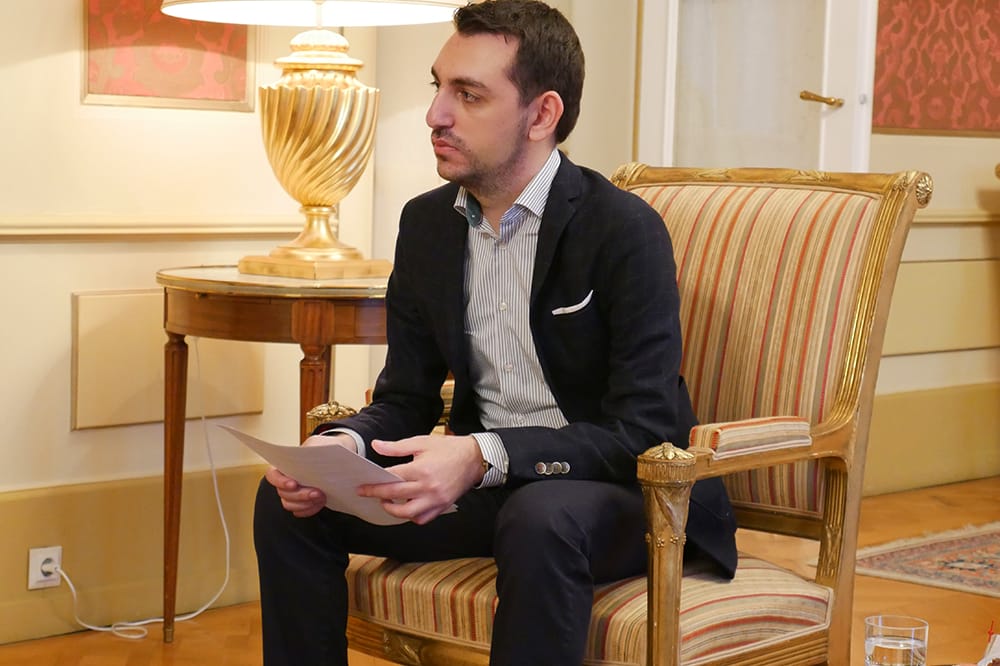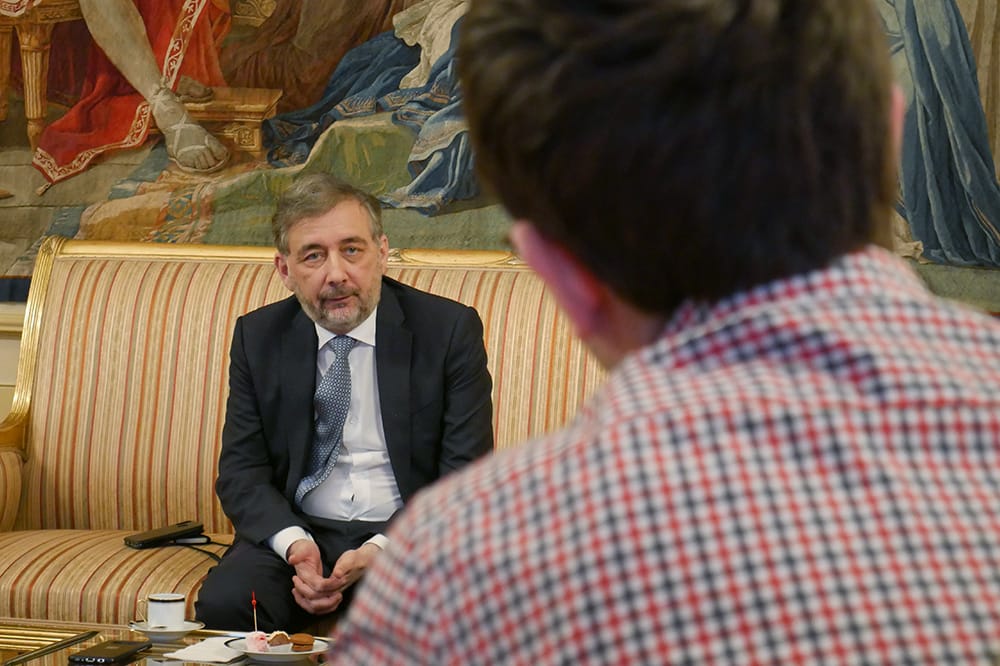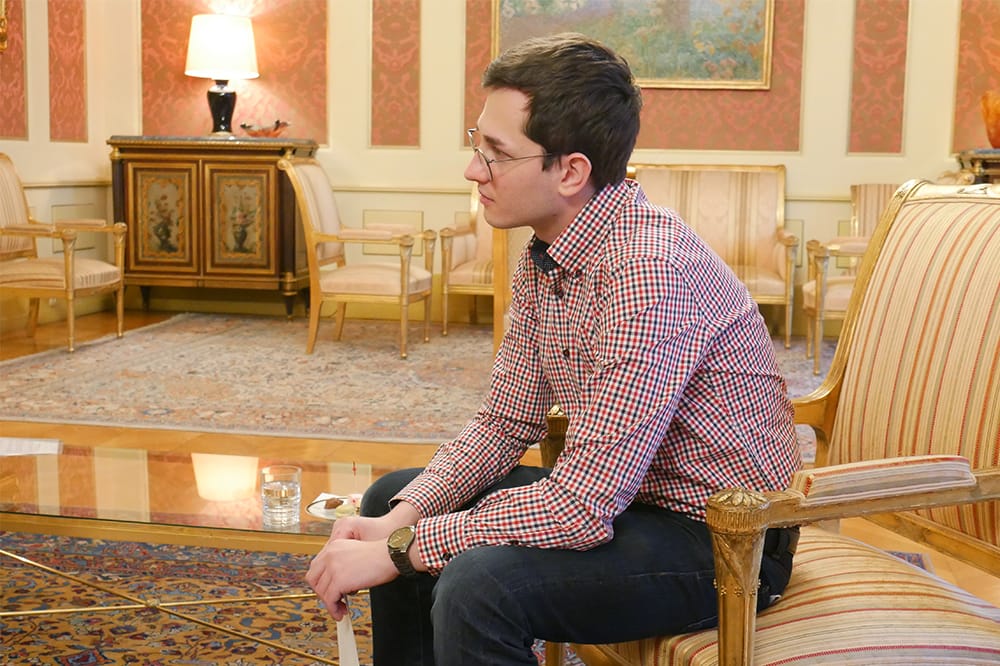Mr. Ambassador, you have been appointed as French Ambassador in Austria since 2020. How have you adapted to life in Austria, especially in times of a pandemic?
I have been here since mid-September, and this is my first job as a diplomat. Thus, this is a new profession in a new country. It is my first posting here in Austria and I do speak a little German, but I knew Austria before since I am married to a professor of German literature and civilization. So it is probably a matter of time before I improve my German.
I also got to know Austria because we had many opportunities to come to this country, especially to Vienna, thanks to my academic relations. But now it is about being in contact with and in front of a country as an ambassador. The bilateral relations between Austria and France were in a positive context, already before my arrival. I had to adapt to a new profession and a particular line of action in this context that has two underlying ambitions, two purposes: The first one is to ensure that Europe is a topic in our discussions so that our bilateral relationship is a means to build Europe together. It seems to be pedestrian to say such a thing, but there were some issues concerning the recovery program that we had to solve in a bilateral manner. Also, the preparations for our future French presidency of the Council of the European Union [from January 2022 until June 2022] are under way. The second aim for me as an ambassador with an academic background is to ensure to intensify our academic, cultural, educational and scientific relationships.
How did I adapt to the covid situation? The answer to this question is simple – I fell ill. Now I take it with humour, but I had severe symptoms. I spent the time from the end of October to the end of November in the main university hospital – the AKH Wien. The healthcare was very professional, efficient and humane, I received very good treatment. Now, it is my responsibility to reflect upon the management of the crisis and especially upon the role of the youth in the present crisis. As you are certainly aware of, there is a reaction now from young people in the academic field in France because we have no face-to-face lessons and we really have to take that into account. We are always talking about mobility for young people, but now mobility is impossible notwithstanding the digital one. We need to find a way out.
When we came in you mentioned that the embassy is a historic building built in times of the Austrian-Hungarian Empire. How are the bilateral relations today?
The bilateral relations are increasingly strong. Why? Because we have common interests in Europe and because we had to react to events such as the terrorist attacks of last autumn. I am not saying that our relations are only related to dramatic events, but I am saying that those events had a strong impact and made us react and reaffirm our common interests. The relationship has an important meaning only in the European context; for instance, the European Green Deal– of which we share many targets. Another example are the attacks. We know that these are common enemies to our common values. The question is: Which are our common values?
Our common values are in the great text of the building of Europe and they are all linked; not to a particular religion, but to the freedom of language and expression, the freedom to believe what we want to believe in. Generally speaking, Europe is not conceived and designed as a fortress, as a closed entity. Europe is diverse; this diversity has to be show in our common values.
There is a high-level Franco-Austrian government program for fighting against terrorism, against radicalism. On 10th November the chancellor paid a visit to President Macron and the day before the French Secretary of State for European Affairs came to Austria to attend ceremonies and to meet minister Edtstadler. This shows that we are reinforcing our relationships on the basis of our common values. This is a way of completing our European common action. But of course, European common actions are bigger than that. As it should, my roadmap as an ambassador is in line with the European roadmap of our future presidency: with the Green New Deal, the digital transition (for promoting DSA and DMA), the cultural, educational and academic issues focused on mobility for the youth, on common and shared cultural values, on the promotion of the French language and on plurilingualism. If think many of these issues are matters of consensus, like the Green Deal. Even if it that has not always been the case.
Furthermore, our bilateral relations are based on history. I am not saying that the past is the most important thing, but I want to remind you that we are not starting from scratch. We are starting with a heritage, with the necessity to benefit from our common cultural, scientific and humanistic past.
In a European Union of 27 states there are usually 27 different interests as well as interest blocks. One of the common issues between France and Austria is the security policy topic regarding terrorism and radicalism. We already talked about the Franco-Austrian relations on that field, but how could they be deepened on a European level?
As you perfectly mentioned, there are bilateral and relations at the EU level. Austria is obviously a country with a regional importance and for France it is important to be connected with a country that is at the heart of a system of not only information but also relations with the Slavkov Group (Czech Republic and Slovakia), with the Visegrad States and the Balkans. We are building a European dimension through our bilateral relations, and it is even better if these bilateral relations could have regional importance.
For instance, when it comes to terrorism: We need the Austrian competence and expertise on the Balkans. Not because the Balkans are only considered a place of transition for terrorism, but because we know perfectly well that there is a specific terrorism connected with the Balkans. Vice versa, in order to fight terrorism, France can bring its experience of radicalism and terrorism in some particular regions of the world. This line of reasoning is also important for other aspects such as economy. Austria is an economic hub for the Balkans.
As an ambassador and an academic I couldn’t help but noticed that in Austria there are less than 600 French students and I am wondering why. All the more as it is the same in France: There are only about 700 Austrians there. This is not normal. Austria has one of the best universities in Europe but why do they lack attractiveness? Of course not. It’s just that, when French students think about German speaking universities, Germany comes to their mind and not Austria. We have to be able to convince the young students that in Austria they can find all the skill and culture and moreover the possibility to be in contact with all the other countries that have natural historical relationships with Austria.
I was surprised as well to observe that no French business school is active in Austria despite France having a very intense economic relationship with Austria. Also, the departments of economics of Austrian universities are very active and dynamic. Why is it so? It is my aim to try to convince some directors of business schools to consider Austria as the centre of relations with for example the Balkans.
We would also like to talk about foreign policy. Another aspect that France and Austria have in common is their position towards Turkey. Some countries, namely the Netherlands, France, Greece, Cyprus and Austria are among those countries with a hard line against Mister Erdogan. Calls for sanctions have multiplied regarding the Turkish influence for example on the conflict between Greece and Cyprus, but also between Armenia and Azerbaijan, where France plays a very active role. First of all, does the EU need to adopt a firm position in general, and secondly, how realistic is a homogenous position within the European Union?
I could answer this question as a historian or as a citizen, but now I am a diplomat. What is the question? The first one is, could Europe as a formal political union adopt one uniform position towards third countries like Turkey? As you know, Turkey has been a candidate for joining the Union. My answer is that as far as the common European values are not jeopardised, each country could have its bilateral economic, cultural and political relationships with another country. This is not only a diplomatic answer, but it is also meant to emphasise that the European Union has a competence for European topics and European common values.
I am not allowed to ask myself a question, but if we want to talk about bilateral relations, perhaps we should be aware of the importance of Africa. We are, for instance, planning to organise a conference or a seminar in Vienna about the European relations with Africa from a French and an Austrian perspective. The Austrian minister of foreign affairs – Mr. Alexander Schallenberg – recently paid a visit to Ethiopia and our minister of foreign affairs – Mr. Jean-Yves Le Drian – has always had good connections to Africa. Also, there is an excellent centre for anti-terrorism in Cote d’Ivoire, which is now designed to be an international centre and not only a bilateral one. So, much interest is being taken in Africa, which is not only a historical one, but also has economic and geopolitical reasons. Of course France has historical relations with Africa, but it is now about the European possibilities and we have to be aware of the fact that with Africa in its own diversity the EU should adopt a common position (it is clear enough dealing with the covid vaccinations as a “bien commun” as it has been promoted by president Macron).
Let me evoke in order to illustrate the way of crossing bilateral and European visions the initiatives we want to launch in preparation for our future presidency.
We will hold a forum of conferences in Vienna – some of them informal – after spring to prepare our EU presidency in 2022 discussing how France and Austria would see European, but also international problems. Some topics are related to the youth, to students and to Europe of Knowledge in September. We will also be addressing the Green Deal. It is common place to say that we are sharing the Green Deal. Yes, we are sharing the targets, but the means to be defined are more concrete and precise. At the end of 2021, for instance, we will also celebrate the inauguration of the night-train between Vienna and Paris. It is very important to have this renewed overnight railway connection, since it is linked with the environment, the recovery program and much more.
Why did I mention this? I wanted to inform you that we are reflecting upon certain topics dealing with France, Austria, and Europe.
Mr. Ambassador, regarding the European vision or the French vision of the European Union, France is considered to be one of the most active countries in the fields of security and military policy, regarding the conflicts we figured out. First of all, does France expect more activity from other European countries, and secondly, in which role does France see itself within the European Union?
I don´t know if I would say more activity, but we expect an equal interest and commitment. In which fields? For instance, in the field of fighting against cyber-terrorism by means of the project of the European regulation which is backed by the French and also the Austrian government. This is all connected to a large cooperation in education.
Recently, I had the opportunity to meet several members of the Austrian government and I can confirm the will and desire for a strong collaboration between our countries around safety, education and the way out of the health crisis, which is now not only an emergency problem, but one of the most important European issues.
We would like to end on a more personal question: You have mostly been active in the academic field – in history and also in international relations. What made you go into diplomacy?
I am mainly and quite only a historian and academic officer, but as the Rector of the academies and the universities of Paris and as an expert on Mediterranean history, I have been asked by our president to be one the three drafters of a Franco-Italian treaty – the treaty of the Quirinale. I was extremely interested in this work and at the end of my mandate as a rector – the rector of Paris traditionally occupies a diplomatic role – I received a proposal from president Macron to try to do what I did study first: diplomacy. I felt greatly honoured and I was immediately enthusiastic and excited to have the chance to represent my country in Austria.
Here, one of my challenges is to be able to read your great literature in your own language – I know it by the translations into French –- but I will try! And I am delighted with the other stimulating activities that come with honouring my mission as an ambassador in this context of strengthening our relations within the European framework.












Kommentare